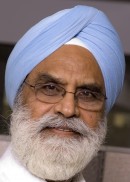My Word: Should all free speech be exported?
 (Orlando Sentinel, October 30, 2012)
(Orlando Sentinel, October 30, 2012)
By Jasbir Singh Bhatia
As the dust settles following the international furor caused by the posting of the movie trailer “Innocence of Muslims” on YouTube, it seems a good time to ask: Should all free speech be exported?
In the United States, unfettered freedom of speech is a cherished right, and the making of this deplorable trailer is seen merely as part of that freedom. But does the right of free expression in our national context — which includes even hate speech — justify the export of such material to countries where norms are so different from ours?
Clearly, the goal of those responsible for making this trailer was to inflame the religious sentiments of Muslims. It worked. The result was mass demonstrations, property destruction, senseless violence, death to protesters themselves and at least “cover” for the murder of four innocent Americans.
Do Google, YouTube, Facebook, Twitter and other electronic-communication vehicles have any obligation concerning the global exportation of free speech when it’s so likely to incite violence and endanger the property and lives of locals and Americans overseas?
Twitter has said yes — at least in some circumstances. Thus it recently blocked the messages of a neo-Nazi group that has been banned by German authorities because of its extremism. Twitter officials say it’s the first time it has withheld content in a specific country, and it was done because of a German government request. But do companies have any obligation to self-regulate even without such requests?
The freedom of expression guaranteed by the First Amendment has consistently been interpreted by the courts to mean that government, under most circumstances, won’t prevent you from saying whatever you want to say. But the Constitution does not say the commercial middlemen who convey an individual’s speech to a larger audience are obligated to transmit anything and everything someone might express.
Freedom of expression is an important right. But technology and our global community have complicated the playing field. Do we as Americans — as corporations and as individuals — need to seriously consider the advisability and our moral responsibility before indiscriminately exporting certain types of expression, even though such expression may be fully protected by law within our own national setting?
Jasbir Singh Bhatia is a past president of the Sikh Society of Central Florida and a member of the executive committee of the Interfaith Council of Central Florida.
